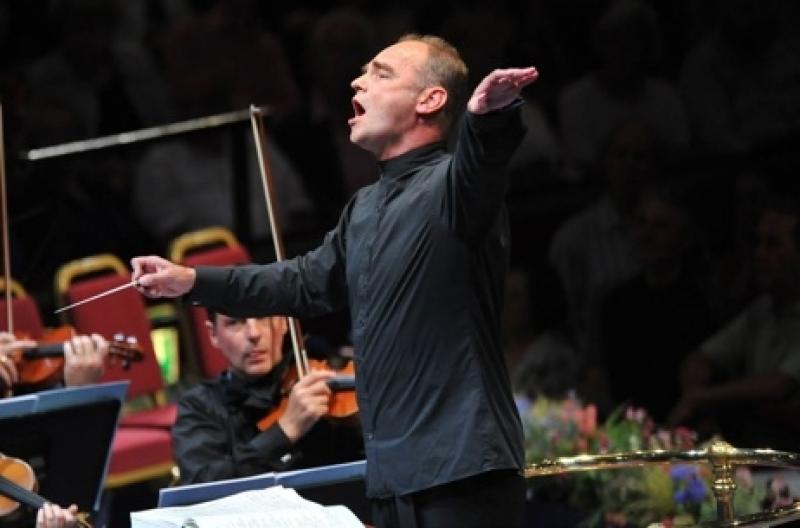“Blessed are the dead”, sings Brahms in the final movement of his German Requiem. And as far as the rest of this concert was concerned it was perhaps just as well. In Mahler’s Kindertotenlieder, the children are all dead; and in Schoenberg’s Survivor from Warsaw everyone else has passed on except, of course, the survivor. The audience was not so much dead as largely absent, frightened off, I suppose, by the dreaded Arnold. Or maybe they were just at home painting pumpkins.
They missed a brave programme, but a brilliant one. Schoenberg’s brusque, utterly unsentimental masterpiece is nevertheless one of his most profoundly moving, and it “cuts” Mahler’s songs in the way that bitters cut a sweet cocktail. Where the Kindertotenlieder mainly exude regret, A Survivor from Warsaw emits a sort of rage, the rage of a composer who, even before reconverting ostentatiously to Judaism, was never much inclined to smile sweetly at this grindingly painful sublunary world. And with rage comes spontaneity. The seven-minute piece was composed, one feels, in about the time it takes to perform.
A speaker (so-called – in fact he has to concoct a kind of speech-song out of a totally inadequate notation) recounts the events of one terrifying day in the Warsaw ghetto, at the end of which a male chorus suddenly strikes up the “Shema Yisrael”, the “Hear, O Israel”, surely one of the great moments in all 20th-century music. Needless to say there is nothing easy about the writing. Even the hymn is a spiky, serial concoction, and the orchestra flickers and flashes like Old Testament lightning.
Hardest of all is the part of the Speaker. The barely contoured vocal line clings to the one-line stave in a way that suggests to me that Schoenberg had very little idea what exactly he wanted the voice to do. David Soar played safe and mostly kept to the contours on the page; but I think this was a mistake. The singer needs to catch the fury of the inspiration, and if this means disrupting Schoenberg’s isobars, so be it. But the rest of the performance under Lothar Koenigs was superb. The male chorus – not very numerous – sang out like the last survivors on a sinking raft, and the orchestra played with refined precision a score than can quickly disintegrate in the wrong hands.
Brahms’s great work brought a kind of earnest consolation
The Mahler, too, was finely played, but disappointingly sung by Sarah Connolly, who seemed reluctant to engage fully with the hideous tragedy – the death from scarlet fever of two of the poet Friedrich Rückert’s six children – and failed to project in the way she would surely do if this were a stage drama (which heaven forbid!). As a result the predominantly slow songs tended to maunder and lose intensity. A shame. Mahler is careful with balance, the scoring very light, with the violins often silent. But the voice still has to come forward and live the moment. Connolly, by and large, was too passive.
After the interval, Brahms’s great work brought a kind of earnest consolation. The performance itself was somewhat unusual, because the WNO Chorus is obviously no amateur choir but a compact, flexible body of professional singers, about 40 voices, used to working as a team. Koenigs used this configuration to the work’s advantage. He reduced the orchestra to well below what one normally hears in this music (I counted three desks of cellos, four of violas – seated far right – and only two of double basses). And this did wonders for Brahms’s textures, which can be bass heavy on modern instruments.
The chorus lacked nothing in volume, of course, but were also able to achieve a thrilling pianissimo. The contrasts in the “ransomed of the Lord” section of the second movement – subito piano at “sorrow and sighing shall flee away” – were effortless, and there were many other such moments: the soft, high tenors in “How lovely is thy dwelling place”, the sudden hush at “We shall not all sleep” in the penultimate movement, and the steady radiance of the whole preceding movement, with Laura Mitchell sustaining the long, high lines with barely a tremor. David Soar was excellent, too, in the baritone solos, rather basso in quality, but more at his ease and prepared, therefore, to risk more drama, in music that certainly has its share. At the same time Koenigs could, with these forces, lighten the tempi; here and there he perhaps overdid it. But Brahms no longer needs a Klemperer. In every sense he is Schoenberg’s “Brahms the Progressive”.













Add comment